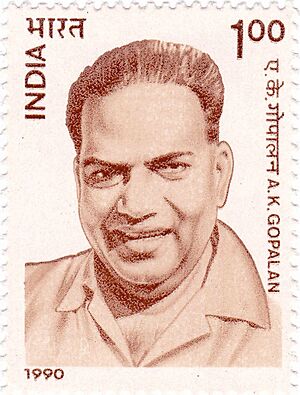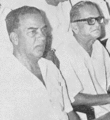A. K. Gopalan facts for kids
Quick facts for kids
A. K. Gopalan
|
|
|---|---|

Gopalan on a 1990 stamp of India
|
|
| Member of the Indian Parliament for Cannanore |
|
| In office 1952–1957 |
|
| Preceded by | Position Created |
| Succeeded by | C. K. Chandrappan |
| Member of the Indian Parliament for Kasaragod |
|
| In office 1957–1971 |
|
| Preceded by | U. Srinivas Mallya South Kanara (North) |
| Succeeded by | Ramachandran Kadannappalli |
| Personal details | |
| Born |
Ayillyath Kuttiari Gopalan Nambiar
1 October 1904 Kannur, Malabar district, Madras Presidency, British India (now in Kerala, India) |
| Died | 22 March 1977 (aged 72) Trivandrum, Kerala, India |
| Political party | |
| Spouse |
Susheela Gopalan
(m. 1952) |
| Parents |
|
| Known for | Co-founder of Communist Party of India (Marxist) |
Ayillyath Kuttiari Gopalan Nambiar (born October 1, 1904 – died March 22, 1977) was a famous Indian politician. He was often known as A. K. Gopalan or AKG. He was a key leader in the Communist Party of India (CPI).
AKG was one of the first 16 CPI members elected to the Lok Sabha in 1952. The Lok Sabha is like the main parliament of India. Later, he helped start a new political group called the Communist Party of India (Marxist).
Contents
Early Life and Education
Ayillyath Kuttiari Gopalan was born on October 1, 1904. His birthplace was Peralasseri in the Kannur District of Northern Kerala. He went to school in Tellichery.
He studied at Basel Evangelical Mission Parsi High School. He also attended Government Brennen College in Thalassery. After finishing his studies, he became a teacher.
At this time, India's fight for independence was growing stronger. Many people were inspired by Mahatma Gandhi. Gopalan joined the Khilafat Movement, which changed his life. He decided to work full-time for social and political causes.
Joining the Freedom Fight
In 1927, A. K. Gopalan joined the Indian National Congress. This was a big political party working for India's freedom. He actively took part in the Khadi Movement. This movement encouraged people to wear Indian-made clothes.
He also worked to help the Harijans, who were a group of people facing discrimination. In 1930, he was arrested for joining the salt satyagraha. This was a peaceful protest against British salt laws.
Kandoth Incident
While Gopalan was in prison, he learned about communism. He then joined the Congress Socialist Party. Later, in 1939, he became a member of the Communist Party of India in Kerala.
He led important marches to support social change. In 1936, he led a hunger march from Malabar region to Madras. He also led the Malabar Jatha. This march supported the demand for a responsible government in Travancore.
Northern Kerala had a very strict caste system. People from lower castes were sometimes not allowed to use public roads. A.K. Gopalan and other activists challenged this. They led a procession through a public road in Payyannur. This road was near the Kandoth Thiyya caste Temple.
Local leaders tried to stop them. But Gopalan and his group continued their march. This event, known as the "Kandoth assault," became famous in the news. It showed Gopalan's strong commitment to equality.
Political Activism and Arrests
When Second World War started in 1939, people protested more against British rule. Gopalan was arrested again. But in 1942, he managed to escape from prison. He stayed hidden until the war ended in 1945.
He was arrested once more after the war. He was still in jail when India became independent on August 15, 1947. He was released a few weeks later.
After India's independence, AKG became a very important politician. He was a member of the Lok Sabha for five terms in a row. He served until his death in 1977. He also became one of the main leaders of opposition parties in the Indian parliament.
Forming a New Party
During the Sino-Indian war in 1962, AKG and other Indian communists wanted both countries to talk and solve the problem peacefully. This view was different from the main party leadership. Many leaders who shared AKG's view were arrested.
Because of these disagreements, the Communist Party of India split. AKG joined the new group, which became known as the Communist Party of India (Marxist). He helped build this new party.
AKG also wrote many books. His autobiography, Ente Jeevitha Kadha, tells his life story. It has been translated into many languages. He also wrote books like For Land and Work in Parliament.
A. K. Gopalan and the Law
In 1950, A. K. Gopalan was held under a law called the Preventive Detention Act. He went to the Supreme Court of India to challenge this. He said his basic rights, like freedom of speech and movement, were being violated.
The Supreme Court looked at his case. Most judges agreed that his detention was allowed. However, they did strike down one part of the law. This part said that the reasons for detention should not be given to the person held. This case is an important part of Indian legal history.
Political Career Highlights
AKG was elected to the Lok Sabha from different areas. Here's a look at his election results:
| Election | Constituency | Result | Majority |
|---|---|---|---|
| 1952 | Cannanore | Won | 87,029 |
| 1957 | Kasargod | Won | 5,145 |
| 1962 | Won | 83,363 | |
| 1967 | Won | 118,510 | |
| 1971 | Palghat | Won | 52,266 |
Family Life
A. K. Gopalan was married to Susheela Gopalan. She was also a well-known Marxist and worked for trade unions. Their daughter, Laila, is married to P. Karunakaran. He was also a Member of Parliament for the Kasargod constituency.
Indian Coffee House
AKG played a big part in starting the Indian Coffee House. This was a special project where workers owned the business together. In the late 1950s, many employees of Coffee Board's Coffee Houses lost their jobs.
AKG helped these workers come together. He helped them set up their own cooperative coffee houses. This gave them jobs and a way to earn a living.
See Also
- E. K. Nayanar
- E. M. S. Namboodiripad
- Azhikodan Raghavan
Images for kids
-
Statue of Gopalan in Kannur.
-
AKG memorial in Thiruvananthapuram.
 | Tommie Smith |
 | Simone Manuel |
 | Shani Davis |
 | Simone Biles |
 | Alice Coachman |






